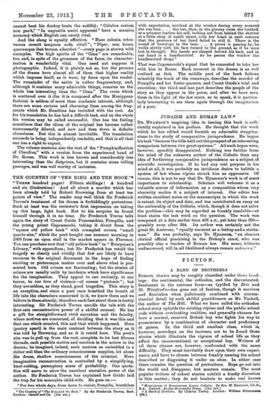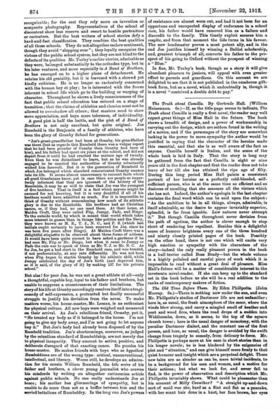FICTION.
A BAND OF BROTHERS.t
SCHOOL stories may be roughly classified under three head- ings: the sentimental, the orthodox, and the discontented. Sentiment in the extreme form—as typified by Eric and St. Winifred's—has gone out of fashion, though it survives and flourishes when judiciously combined with circum- stantial detail by such skilful practitioners as Mr. Vachell, the author of The Hill. What we have called the orthodox school story upholds the existing regime and the public school code without overlooking realities, and generally chooses for hero a normal, reserved British boy who fights his way to prominence by a combination of character and proficiency at games. In the third and smallest class, which is, however, nowadays on the increase, are to be found those stories which illustrate the rigours of school life as they affect the unconventional or exceptional boy. Writers of all three classes are, however, confronted with the same difficulty. They must inevitably draw upon their own experi- ences, and have to choose between frankly naming the school described or disguising it under an alias. In either case there remains the question of portraiture. Boys go out into the world and disappear, but masters remain. The most popular writers of school stories exhibit a kindly discretion in this matter ; they do not hesitate to make real heroes • Mosaie,arum et Romanarum Legum Cottatio. By Rev. M. Hyarnson, LL.D.. B.A. Oxford : At the Uriversity Press. [21s. net.] t A Band of Brothers. By Charles Turley. London: William Heinemann. [6a.]
recognizable; for the rest they rely more on invention or composite photography. Representatives of the school of discontent show less reserve and resort to hostile portraiture or caricature. But the best writers of school stories defy a bard-and-fast classification. They combine the best qualities of all those schools. They do not altogether eschew sentiment, though they avoid " slopping over "; they loyally recognize the virtues of the public school system, but they are not blind to the defects of its qualities. Mr. Turley's earlier stories, admirable as
they were, belong,,ed substantially to the orthodox type, but in his later ventures, and more especially in A Band of Brothers, he has emerged on to a higher plane of detachment. He
retains his old geniality, but it is leavened with a shrewd yet kindly criticism. He is no longer so exclusively concerned with the human boy at play ; he is interested with the forces inherent in school life which go to the building or warping of character. Throughout he shows a lively consciousness of the fact that public school education has entered on a stage of transition ; that the claims of athletics and classics must not be allowed to overshadow all others ; that masters need to show more appreciation, and boys more tolerance, of individuality.
A good plot is half the battle, and the plot of A Band of Brothers is not only excellent, but quite original. Joe
Rumbold is the Benjamin of a family of athletes, who have been the glory of Granby School for generations.
"Joe's great-grandfather had been at Granby, his grandfather was there (but as regards this Rumbold there was a vulgar report that he had been prouder of Granby than Granby had been of him), and his father had spent six years at the school, and did not depart from it until he had reached the mature age of twenty. Even then he was disinclined to leave, but as he was already engaged to be married the authorities of Granby reluctantly wished him farewell. But it is the generation of Rumbold to which Joe belonged which absorbed concentrated Granby essence into its life. It seems almost unnecessary to recount facts which all good Granbeians know, yet in case there are people so imper- fectly informed that they are ignorant of the history of the Rumbolds, it may be as well to state that Joe was the youngest of five brothers. That in itself is a fact which anyone might be excused for not knowing., but it is very doubtful if all of his brothers would have admitted as much. For it is impossible to think of Granby without rememhering how much of its athletic glory is due to the Rumbolds. His brothers had no Christian names, or, if they bad, no one used them. At their home, at Maiden Croft, they were called Flip, Jumpy, Pads, and Bingo. To the outside world, by which is meant that world which takes more interest in games than in things like politics and the Navy, they were known as M. R., T. J., N. C., and P. S. (which last initials ought certainly to have been reserved for Joe, since he was born five years after Bingo). At Maiden Croft there was a delightful etiquette to be observed about these forms of address. It would have been quite correct to have asked a gardener if he had seen Mr. Flip or Mr. Bingo, but when it came to Jumpy or Pads the rule was to speak of them as Mr. T. J. or Mr. N. C. As for Joe, he got a bad start in the Rumbold race, and was treated, if not preferentially, at any rate differently. He was not born when Flip began to startle Granby by his athletic skill, while Jumpy celebrated the day of Joe's birth (and deprived him, so it is said, of the glory of it) by making 137 for his private schooL" Bat alas! for poor Joe, he was not a great athlete at all—only a thoughtful, capable boy, loyal to his father and brothers, but unable to suppress a consciousness of their limitations. The
storyof his life at Granby accordingly resolves itself into a tragi- comedy of self-expression, a protracted but finally successful struggle to justify his deviation from the norm. To make matters worse, his house-master, Mr. Lomax, is an enthusiast for physical culture. All new boys were weighed and measured on their arrival. As Joe's rebellious friend, Ormsby, put it, "He treated my body as if it belonged to the house. I'm not going to give my body away, and I'm not going to let anyone buy it." But Joe's body had already been disposed of by the Rumbold tradition. Joe's shortcomings, moreover, as judged by the relentless standard of Rumboldship, are not merely due to physical incapacity. They amount to active, positive, and deliberate disregard of that exacting canon. He puzzles his house-master. He makes friends with boys who ex hypothesi Bumboldiana are of the wrong type: critical, unconventional, intellectual, and literary. Worse still, he develops an admira- tion for his cousin William Rumbold, the bete noire of his father and brothers, a clever young journalist who crowns his misdeeds by writing an altogether antinomian article against public schools. No one really understands Joe at borne; his mother has glimmerings of sympathy, but is linable to do more than act as a buffer between him and the serried battalions of Rurnholdry. In the long run Joe's powers of resistance are almost worn out, and had it not been for an opportune and unexpected displa,y of endurance in a school race, his father would have removed him as a failure and discredit to the family. This timely exploit secures him a respite, and from that moment the tide turns in his favour. The new headmaster proves a most potent ally, and in the end Joe justifies himself by winning a Balliol scholarship, and, greatest triumph of all, converts his father to the pro- spect of his going to Oxford without the prospect of winning a "Blue."
In fine, Mr. Turley's book, though as a story it will give abundant pleasure to juniors, will appeal with even greater effect to parents and guardians. On this account we are delighted to see that it is not published in the cumbrous gif t- book form, but as a novel, which it undoubtedly is, though it is a novel "contrived a double debt to pay."



















































 Previous page
Previous page